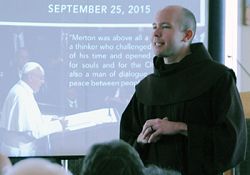Laudato Si' interpreted through Thomas Merton
Friday, Feb. 03, 2017

IC photo/Marie Mischel
+ Enlarge
Franciscan Father Daniel Horan presents the 2017 Aquinas Lecture, "Learning from Thomas Merton about Laudato Si'," on Jan. 29 at Saint Catherine of Siena Newman Center in Salt Lake City.
SALT LAKE CITY — During the 2017 Aquinas lecture Father Daniel Horan urged Utahns to undergo the environmental conversion called for by Pope Francis in the encyclical “Laudato Si’.”
“God is calling us to that. Are we listening? Are we open to that?” asked Fr. Horan, a Franciscan friar of Holy Name Province who is a theologian and an expert on Thomas Merton, the Trappist monk who published dozens of books on spirituality in the middle of the 20th century.
In his lecture, titled “Learning from Thomas Merton about Laudato Si’,” Fr. Horan said that Merton and Pope Francis might seem “like an odd fit,” but during his 2015 visit to the United States, the Holy Father himself mentioned the Trappist monk, saying that Merton “remains a source of spiritual inspiration and a guide for many people. … Merton was above all a man of prayer, a thinker who challenged the certitudes of his time and opened new horizons for souls and for the Church. He was also a man of dialogue, a promoter of peace between peoples and religions.”
Pope Francis made that comment only a few months after the publication of his encyclical, which bears the subtitle “On Care for our Common Home.” The encyclical calls for all people who share the earth, “our common home,” to resolve the “global environmental deterioration.”
In addressing environmental issues, Pope Francis was continuing a theme written about by some of his predecessors, including Paul VI, John XXIII, John Paul II and Benedict XVI.
In his own 1963 encyclical “Pacem en terris,” John XXIII called Christians to look, judge and act in light of the Gospel; “Laudato Si’” looks at the world, sees that the environment is in crisis and asks, “What are we going to do about it?” Fr. Horan said.
The encyclical is a mandate for political engagement, he added, and this makes some people uncomfortable; some ask why the Catholic Church is involved in the world in this way. Fr. Horan’s response is that “all theology and all faith is inherently political, though it shouldn’t be partisan. … Pope Francis calls us in the spirit of looking and observing to recognize that we have forgotten our relation with the rest of creation.”
While Pope Francis’ call for environmental conversion comes some 50 years after Merton died, the Trappist monk came to his own “awareness of the created world around him, his relationship to that, the importance of caring for creation and an alertness, an attentiveness to the ways in which we human beings, we of this species homo sapiens, have not been particularly great members of the family of creation,” Fr. Horan said.
Merton originally wrote about prayer and contemplation and religious life, but in the 1950s and 1960s he had an awareness that “you can’t just be a Christian alone,” Fr. Horan said; through the Sacrament of Baptism, Catholics are united to the Body of Christ.
Merton “also came to ecological conversion … but it was a slow and ongoing process,” Fr. Horan said. “He struggled with all the same things we struggle with.”
Eventually, however, Merton came to see that “all creation is indeed a vestige of God,” and he wrote about his interactions with nature and his sense of kinship with it. By the 1960s he developed a growing awareness of social injustice issues, and wrote that he felt the need to stop writing about things like meditation and instead “face the big issues, the life-and-death issues” like war and poverty.
Like Merton, every person is called to examine his or her conscience for ecological conversion, educate themselves and others on the issues, and put this call into action, Fr. Horan said as he ended his talk. “Action is required for all of us, but it varies for each of us depending on our location and our context. We aren’t called to do the same thing, but we’re all called to do something.”
For questions, comments or to report inaccuracies on the website, please CLICK HERE.
© Copyright 2024 The Diocese of Salt Lake City. All rights reserved.
© Copyright 2024 The Diocese of Salt Lake City. All rights reserved.

Stay Connected With Us